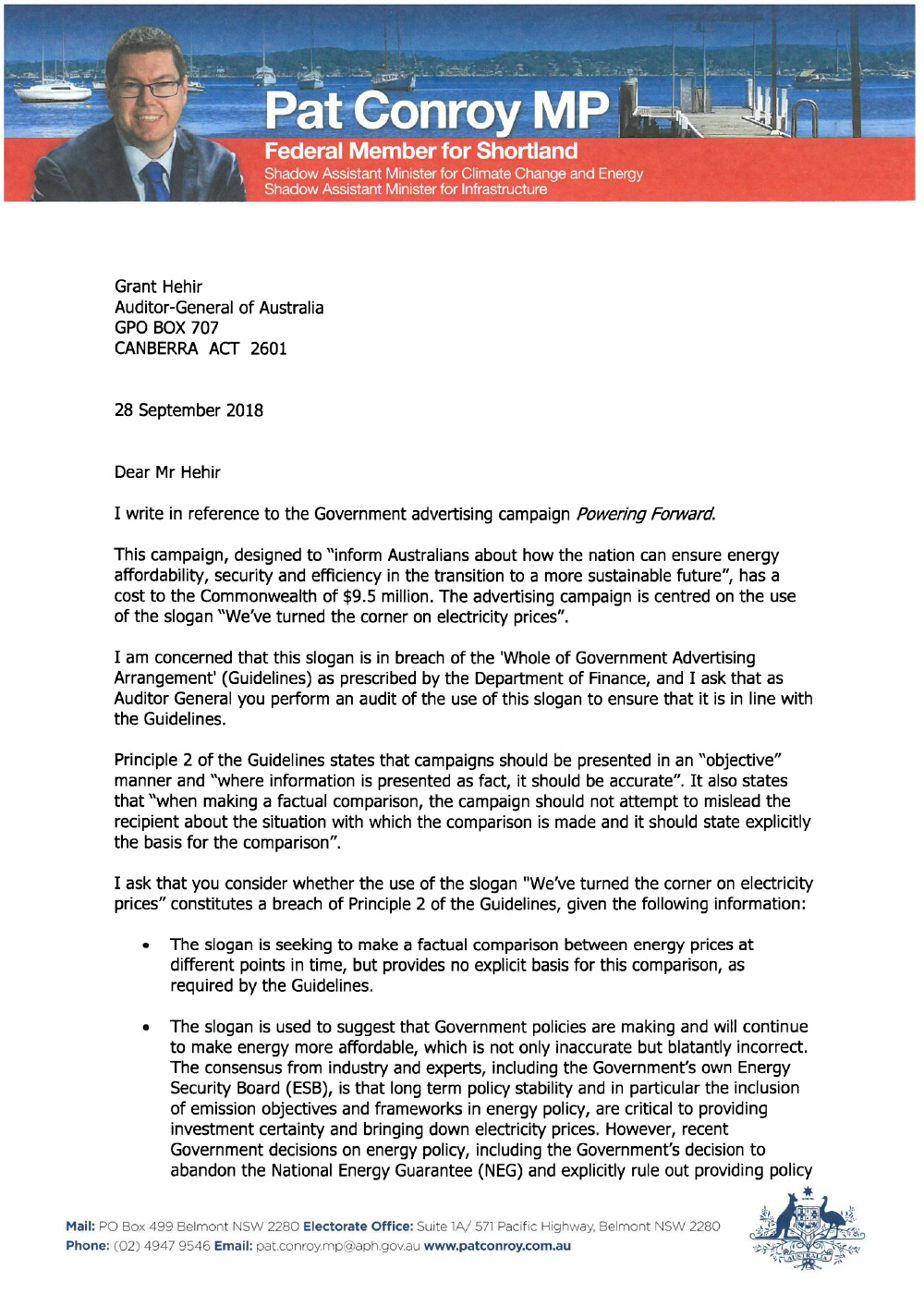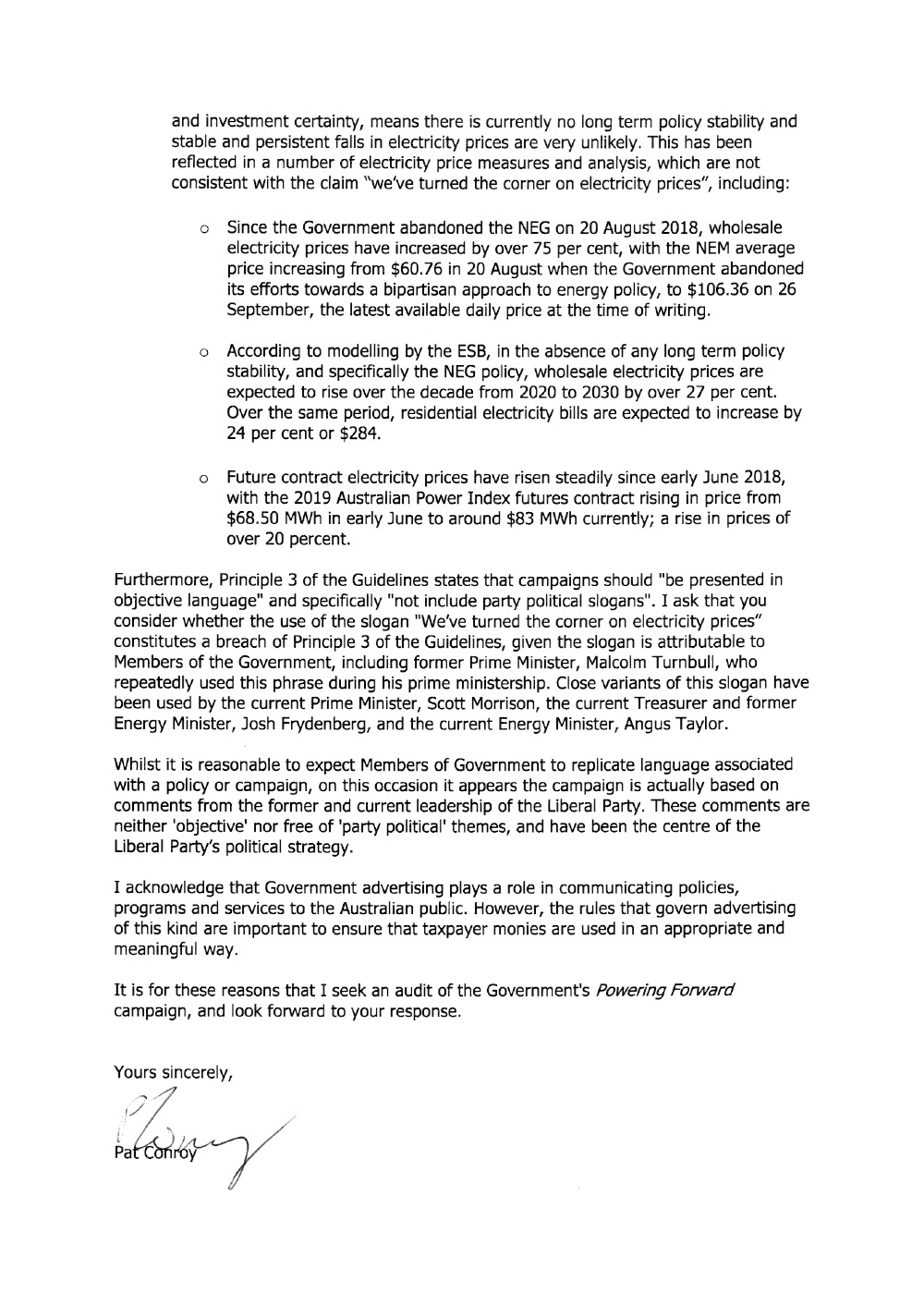Browse our range of reports and publications including performance and financial statement audit reports, assurance review reports, information reports and annual reports.
Government advertising campaign: Powering Forward

Please direct enquiries through our contact page.
The Auditor-General has responded to a request from Mr Pat Conroy MP dated 28 September 2018, asking that the Auditor-General conduct an audit of aspects of the Government advertising campaign: Powering Forward.
Auditor-General's response
8 October 2018
The Hon. Pat Conroy MP
Federal Member for Shortland
PO Box 499
Belmont NSW 2280
By email pat.conroy.mp@aph.gov.au
Dear Mr Conroy
ANAO Performance Audit – Government Advertising
Thank you for your letter of 28 September 2018 requesting that I consider an audit of the Government’s Powering Forward campaign.
I commenced a performance audit of government advertising on 25 September 2018. The objective of the audit is to assess the effectiveness of the Department of Finance’s and selected entities’ implementation of the Australian Government’s campaign advertising framework.
As part of the audit, the ANAO will review the following campaigns:
- Department of Environment and Energy— Energy for the Future campaign (also known as Powering Forward);
- Department of Education and Training— National Child Care Reforms campaign; and
- Department of Health— Physical Activity for Young Women campaign.
The audit report is anticipated to table in mid-2019.
The matters you raised will be considered in the context of the audit.
Yours sincerely
Grant Hehir
Correspondence from Mr Pat Conroy MP


Transcript of letter from Mr Pat Conroy MP
Grant Hehir
Auditor-General of Australia
GPO BOX 707
CANBERRA ACT 2601
28 September 2018
Dear Mr Hehir
I write in reference to the Government advertising campaign Powering Forward.
This campaign, designed to “inform Australians about how the nation can ensure energy affordability, security and efficiency in the transition to a more sustainable future”, has a cost to the Commonwealth of $9.5 million. The advertising campaign is centred on the use of the slogan “We’ve turned the corner on electricity prices”.
I am concerned that this slogan is in breach of the ‘Whole of Government Advertising Arrangement’ (Guidelines) as prescribed by the Department of Finance, and I ask that as Auditor General you perform an audit of the use of this slogan to ensure that it is in line with the Guidelines.
Principle 2 of the Guidelines states that campaigns should be presented in an “objective” manner and “where information is presented as fact, it should be accurate”. It also states that “when making a factual comparison, the campaign should not attempt to mislead the recipient about the situation with which the comparison is made and it should state explicitly the basis for the comparison”.
I ask that you consider whether the use of the slogan “We’ve turned the corner on electricity prices” constitutes a breach of Principle 2 of the Guidelines, given the following information:
- The slogan is seeking to make a factual comparison between energy prices at different points in time, but provides no explicit basis for this comparison, as required by the Guidelines.
- The slogan is used to suggest that Government policies are making and will continue to make energy more affordable, which is not only inaccurate but blatantly incorrect. The consensus from industry and experts, including the Government’s own Energy Security Board (ESB), is that long term policy stability and in particular the inclusion of emission objectives and frameworks in energy policy, are critical to providing investment certainty and bringing down electricity prices. However, recent Government decisions on energy policy, including the Government’s decision to abandon the National Energy Guarantee (NEG) and explicitly rule out providing policy and investment certainty, means there is currently no long term policy stability and stable and persistent falls in electricity prices are very unlikely. This has been reflected in a number of electricity price measures and analysis, which are not consistent with the claim “we’ve turned the corner on electricity prices”, including:
- Since the Government abandoned the NEG on 20 August 2018, wholesale electricity prices have increased by over 75 per cent, with the NEM average price increasing from $60.76 in 20 August when the Government abandoned its efforts towards a bipartisan approach to energy policy, to $106.36 on 26 September, the latest available daily price at the time of writing.
- According to modelling by the ESB, in the absence of any long term policy stability, and specifically the NEG policy, wholesale electricity prices are expected to rise over the decade from 2020 to 2030 by over 27 per cent. Over the same period, residential electricity bills are expected to increase by 24 per cent or $284.
- Future contract electricity prices have risen steadily since early June 2018, with the 2019 Australian Power Index futures contract rising in price from $68.50 MWh in early June to around $83 MWh currently; a rise in prices of over 20 percent.
Furthermore, Principle 3 of the Guidelines states that campaigns should “be presented in objective language” and specifically “not include party political slogans”. I ask that you consider whether the use of the slogan “We’ve turned the corner on electricity prices” constitutes a breach of Principle 3 of the Guidelines, given the slogan is attributable to Members of the Government, including former Prime Minister, Malcolm Turnbull, who repeatedly used this phrase during his prime ministership. Close variants of this slogan have been used by the current Prime Minister, Scott Morrison, the current Treasurer and former Energy Minister, Josh Frydenberg, and the current Energy Minister, Angus Taylor.
Whilst it is reasonable to expect Members of Government to replicate language associated with a policy or campaign, on this occasion it appears the campaign is actually based on comments from the former and current leadership of the Liberal Party. These comments are neither ‘objective’ nor free of ‘party political’ themes, and have been the centre of the Liberal Party’s political strategy.
I acknowledge that Government advertising plays a role in communicating policies, programs and services to the Australian public. However, the rules that govern advertising of this kind are important to ensure that taxpayer monies are used in an appropriate and meaningful way.
It is for these reasons that I seek an audit of the Government’s Powering Forward campaign, and look forward to your response.
Yours sincerely,
Pat Conroy